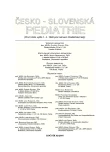-
Medical journals
- Career
Anemia, Nonspecific Intestinal Inflammations and Possible Diagnostics
Authors: A. Šuláková
Authors‘ workplace: Klinika dětského lékařství, Fakultní nemocnice s poliklinikou, Ostrava přednosta h. doc. MUDr. J. Slaný, CSc.
Published in: Čes-slov Pediat 2007; 62 (6): 398-405.
Category: Review
Overview
Anemia is a frequent complication of nonspecific intestinal inflammations (NSZ). It occurs in 30–70% of patients, significantly influences their performance, cognitive functions and may result in substantial decreased of the quality of life of the patient. About one third of the patients with NSZ suffer from severe type of anemia, which is associated with extensive inflammatory affection of intestine and bleeding into intestine. Most significant etiopathogenetic factors are iron deficit and chronic inflammation. Discovery of the anemia cause in patients with NSZ is often difficult, but it is necessary for possible risks of supplementation iron therapy in patients with chronic intestinal inflammation. sTfR (soluble transferrin receptor) and TfR/F index (sTfR/log ferritin) is a sensitive and specific noninvasive laboratory test for the determination of iron deficit and activity of erythropoiesis suitable for the diagnostics also in patients with chronic inflammation in children and adolescents.
Key words:
anemia, iron deficit, anemia in chronic diseases, nonspecific intestinal inflammations, soluble transferring receptor
Labels
Neonatology Paediatrics General practitioner for children and adolescents
Article was published inCzech-Slovak Pediatrics

2007 Issue 6-
All articles in this issue
- Anemia, Nonspecific Intestinal Inflammations and Possible Diagnostics
- Hyperkinetic Disorder at the Child Age
- Different Manifestations of the Fragile X Chromosome Syndrome and Their Causes
- Childhood Injury in Four Czech Regions
- Long-term Results of Gastric Transposition in Children
- Is There a Metabolic Syndrome in the Childhood?
- Nitrobenzene Poisoning of a 4.5-year Boy
- Congenital Myasthenic Syndrome (CMS)
- Czech-Slovak Pediatrics
- Journal archive
- Current issue
- Online only
- About the journal
Most read in this issue- Different Manifestations of the Fragile X Chromosome Syndrome and Their Causes
- Congenital Myasthenic Syndrome (CMS)
- Nitrobenzene Poisoning of a 4.5-year Boy
- Long-term Results of Gastric Transposition in Children
Login#ADS_BOTTOM_SCRIPTS#Forgotten passwordEnter the email address that you registered with. We will send you instructions on how to set a new password.
- Career

